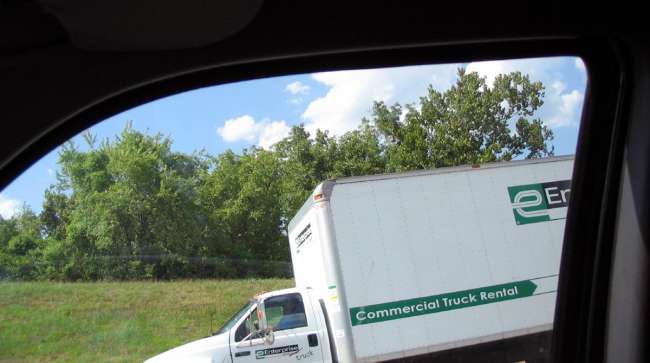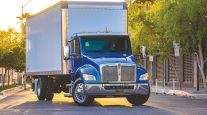Enterprise Adding 40 Locations Nationwide as Truck Rental Business Grows

Enterprise Holdings, best known for renting cars to vacationers and business travelers, is growing its truck rental business for corporate customers and people moving household goods and boats.
Enterprise Truck Rental has grown from 100 locations a decade ago to 330 in North America today. The company plans to add 40 truck rental locations in the coming year, including expanding beyond St. Louis’ three truck rental centers in Crestwood, north St. Louis County and the downtown west neighborhood.
“Our local group is actively looking at real estate now in areas where there is commercial growth and consumer demand,” said Frank Thurman, Enterprise Truck Rental’s corporate vice president. “We believe in St. Louis there are opportunities for another four locations in the not too distant future.”
Clayton-based Enterprise first began renting commercial trucks in 1999 and expanded truck rentals for personal use a decade later. Rentals for personal use, including those renting pickups to move furniture or tow boats, has grown to 20% of Enterprise Truck Rental’s business, with commercial rentals totaling 80% of its truck rentals. As its added locations, the truck rental division’s full-time headcount grew 15% this year to 1,250 employees.
For commercial customers, Enterprise Truck Rental plans to introduce a new product soon to allow customers to comply with looming government mandates for electronic logging devices on trucks over 10,000 pounds.
Driving the business growth is recognition by small business owners, particularly after the Great Recession, that renting vehicles can be more cost-effective than owning, Thurman said. “There’s a growing receptiveness to using things on demand,” he said. “There’s a changing mentality that you don’t have to own your assets.”
Rising truck prices are prompting owners to turn to rentals during surges in their business, said Casey Deak, vice president and senior analyst at Wells Fargo Securities in Baltimore. “It makes sense (for Enterprise) to grow into that market because companies are starting to be smarter about their purchases of trucks as the price of trucks has gone up so much,” Deak said.
For truck rentals for personal use, the shrinking size of pickups’ beds is leading to an increase in truck rentals, said Ian Gilson, a senior analyst at Zacks Small Cap Research in San Diego. Many pickup owners have opted for extended cabs in recent years that increase seating space but cut down on bed space. “If you want to carry around Grandma’s sofa, you have to rent,” Gilson said.
The U.S. truck rental business is a $19 billion industry, according to market research firm IBISWorld. Ryder leads with 14.3% market share, according to IBISWorld’s October 2016 report, followed by Penske Corp.’s 13.1%, U-Haul’s 12% and Enterprise’s 11.5%.
As it competes against rivals with larger market share, Enterprise Truck Rental is seeking to boost its visibility by placing its truck rental facilities in more heavily trafficked areas.
“Commercial truck rental facilities have been tucked away and not easy to find,” Thurman said. “We’ve been much more focused on higher visibility. We’ve made a move to be more visible to capitalize on our recognizable brand.”
The move toward increased visibility for its truck rental business is reflected in the company’s marketing. Enterprise’s latest commercials highlight multiple transportation offerings, including truck rentals, luxury vehicle rentals and car sales, marking a shift from its prior advertising strategy focused mostly on car rentals.
“A large part of our messaging now is Enterprise isn’t just about car rentals,” Thurman said.
Competitors with greater name recognition in truck rentals remain a big obstacle for Enterprise, said Jim Barrett, an analyst and managing director of C.L. King & Associates in New York City.
Phoenix-based U-Haul has more than 21,000 locations in the U.S. and Canada and recently added the U-Haul Truck Share 24-7 self-service program that allows people to access trucks around the clock, even when U-Haul stores are closed. Amerco, U-Haul’s parent company, reported last week that it increased its truck fleet in its most recent quarter and expanded its dealer network and company-owned locations.
“When you think of renting a truck, the name that comes to most people’s minds is U-Haul, and Enterprise is pretty low down the list,” Barrett said.
But Zacks’ Gilson said Enterprise’s status as the world’s largest rental car company and its promise to pick up customers will help in its effort to grow market share in truck rentals.
Enterprise Holdings, whose brands include Enterprise Rent-A-Car, Alamo Rent A Car and National Car Rental, is the country’s 13th-largest privately held company, according to Forbes magazine’s 2017 rankings. The rental car company with $20.9 billion in annual revenue in fiscal 2016 has invested heavily in recent years to grow its international presence to more than 9,600 locations around the world.
“Their business model has worked,” Gilson said of Enterprise. “There’s room to grow in the industry if they’re prepared to spend capital on locations and trucks.”
Distributed by Tribune Content Agency, LLC


